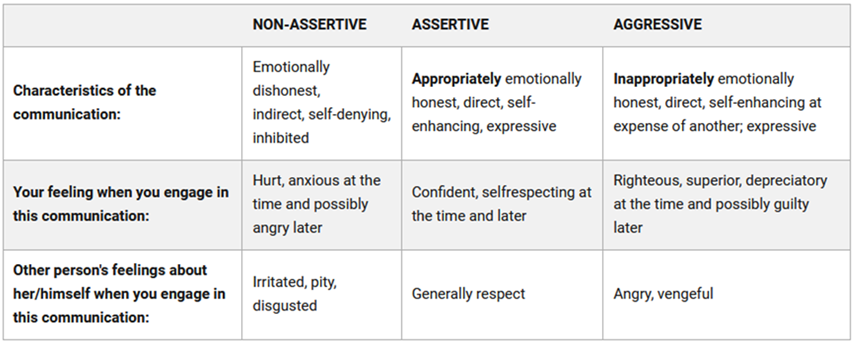In any work situation (as well as outside of your job), you have a choice to be assertive, aggressive, or non-assertive. Your choice depends on many factors, of course, but which choice is typically the right one?
Let’s start with a definition of the three choices we all have:
Non-assertive Behavior: If you leave decisions to others or make decisions to avoid conflict, you are acting non-assertively. A non-assertive person is one who is often taken advantage of, feels helpless, takes on everyone’s problems, says yes to inappropriate demands and thoughtless requests, and allows others to choose for him or her. Non-assertion is failing to stand up for oneself, or standing up for oneself in such an ineffectual manner that one’s rights are easily violated.
Aggressive Behavior: If you make decisions based on their potential for influencing others, or with no regard to their impact on others, you are acting aggressively. Aggression is standing up for oneself in such a manner that the rights of the other person are violated or harmed in the process. It can also be an attempt to humiliate or put down the other person.
Assertive Behavior: If you make decisions based on information and your needs, you are acting assertively. Being assertive means communicating with others in a direct and honest manner without intentionally hurting anyone’s feelings. Direct communication can reduce conflict, build self-confidence and enhance personal and work relationships. Assertiveness is a skill that anyone can learn. Assertion is standing up for oneself in such a way that one does not violate the basic rights of another person. It’s a direct, honest, and appropriate expression of one’s feelings and opinions.

Clearly, assertive behavior is the preferred option. And to think of it another way:
- To act aggressively, requires a win/lose mindset. I win and you lose.
- To act non-assertively, requires a lose/win mindset. I lose and you get to win.
- To act assertively, requires a win/win mindset. I will assert my rights and, at the same time, respect your rights during any communication or interaction together.
Being assertive allows you to express your needs, thoughts, and feelings honestly and directly without violating the rights of others. Acting assertively enables you to:
- Gain self-esteem
- Gain confidence
- Stand up for yourself when you need to
- Negotiate productively
- Promote your personal growth and fulfillment
- Take responsibility for the quality of your relationships with others
Take a moment to step back and ask yourself if you are generally assertive, aggressive, or non-assertive? What situations bring out different behaviors for you? How does each make you feel? Which one will be most satisfying and productive in your relationships?
Think about situations when you behave in an aggressive or non-assertive manner and determine how you can behave in an assertive manner more frequently.
Offer: If you’d like to learn about a 3-part formula for being more assertive, contact me with that request and I’ll send you a helpful resource.
Sources: My friends at HPI Solutions; Wikipedia

